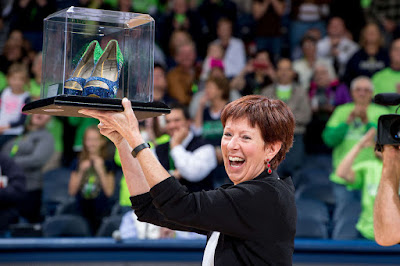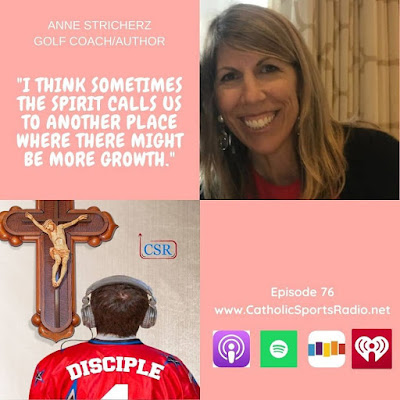Over time, every community develops its own vernacular—terms and words that take on a meaning familiar to those on the inside. I would like to read a study about groups with a strong identity: Does their lexicon loom larger than others/ My basis for comparison is my alma mater, the University of Notre Dame.
I have noticed that those familiar with the Fighting Irish will drop term on me like "Domers" or reference reputable venues such as "the Backer." Others ask me what it was like going to school in South Bend. However, referencing this Indiana city in recent years isn't uncommon or unique as it once way. And, as the latest issue of Notre Dame Magazine affirms, there's good reason for it.
The Summer 2020 issue: The South Bend Issue pursued "those stories that spoke of South Bend and its relationship with the University, the renewal taking place in the city and adjacent communities." It is PACKED with stories and profiles of people and places, projects and partnerships that reflect why there's such a buzz about town. The purpose of this blog is to point the stories that speak to Sports and Spirituality in and around South Bend. Enjoy.
NB: These are listed in the order they appear in ND Magazine
In case it wasn't already clear: "Here’s persuasive evidence that Muffet McGraw is Notre Dame’s most successful coach since Knute Rockne. In 33 seasons at the University her teams won 77 percent of their games, with 29 of her 33 teams winning 20 games or more (including 11 30-win seasons). Those teams won two national championships, made nine trips to the Final Four and took 14 regular-season conference championships. She coached 22 All-Americans, was named consensus national coach of the year three times and in 2017 was inducted into the Naismith Memorial Basketball Hall of Fame. Her teams also packed the house, attracting a loud, loyal and festive fan base to the court inside the Joyce Center, when most women’s basketball teams had difficulty drawing spectators."
The story of her NOT boarding United Flight 175 that crashed into the south tower of the World Trade Center on 9/11 still gets me.
A historical perspective on how the world handled the Spanish Flu has helped me put COVID-19 into some much needed context. I shouldn't be surprised but I was still deeply saddened to read and realize that there were nine deaths among the students. "The University had about 1,500 students in the fall 1918, with more than 200 cases of the disease."
As we await the fate of Irish football, it was interesting to read, "The Notre Dame football team — led by new head coach Knute Rockne and including star player George Gipp — canceled or postponed three October games because of the ban on public gatherings, including a match with the team from Great Lakes Naval Station. Notre Dame resumed its football schedule in November, playing its final five games to finish the 1918 season at 3-1-2."
Time will tell how the 2020 season will follow....
Gil Loescher, a 6-foot, 8-inch former varsity basketball player at Saint Mary’s College of California, visited Vietnam and Cambodia on a research trip and spent time with war refugees. The experience had a profound effect on him; the plight of refugees became his life’s work.
I had several classes that were cross-listed as a Peace Studies course. Wish I had taken even more of those.
A Community that Cares by Beth Lohmuller Grisoli '87
I have heard many times that the best thing about Charlie Weis is his wife, Maura. This should not be interpreted as a slight against Coach Weis but rather a full endorsement for his better half as just that.
Maura Weis is the founder of Hannah and Friends—a nonprofit service for children with special needs. Furthermore, Sound Bend is home to the Logan Center—a place to support people with intellectual disabilities of all ages. The author, a parent of a child with cerebral palsy, encountered a city that seemed to say, “We care about what happens to our citizens with special needs. And we care enough to invest in serving them well.”
People with developmental delays need more help than their families can give, and they want to flourish in society, not simply survive. Special-needs children grow into special-needs adults who want jobs to feel productive and friends to feel human. To say it’s difficult having a family member with an intellectual disability seems too benign. It’s not simply difficult, but terribly difficult at times.
As much as we are amazed by what our football coaches do, what their spouses do off the field is often equally compelling.
I don't know if Jürgen Klopp's stock could rise any higher on this blog right now. And then I read about his time at Notre Dame last summer. #Fangirl
His team team was in town for the July 2019 soccer match "between two of the world’s best teams, Liverpool F.C. and Borussia Dortmund."
Jorgensen writes
It is not normal for a city like South Bend, population 101,860, to attract events of this magnitude. Liverpool played other elite European clubs at Fenway Park and Yankee Stadium, and Dortmund had another match at CenturyLink Field, home of the Seattle Seahawks. “It’s pretty remarkable,” says DeCleene. “To have South Bend in that mix is a pretty great feather in our cap.”
The teams were in town for a few days and hosted open practice sessions at Alumni Stadium — my chance, I thought, to meet my heroes from the Liverpool team I have followed since I was growing up in Denmark. But I was wrong. Alumni Stadium, which seats 3,000, was full of fans who had to be reminded to stay quiet so that players and coaches could communicate.
It was still something to see. So was Notre Dame’s practice facility, according to Liverpool coach Jürgen Klopp. “Notre Dame is, wow,” he said at the time. “No club in the world has facilities like the University of Notre Dame. It’s just not possible.”
Notre Dame IS Wow. I'm sure he smiled as he said this....
This article profiles the downtown South Bend ballpark that is the home to the Chicago Cubs, a Single A minor league team. The owner Andrew Berlin invested in the downtown ballpark and boldly made the claim "It's not just about baseball."
The article states:
“When Andrew purchased the ball club, it was our goal to develop and cultivate an experience at Four Winds Field that will bring people back downtown,” Hart told the South Bend Tribune two years ago. “We wanted the ballpark to be a community gathering point that would provide an entertainment experience like no other.” It worked.
One midsummer Friday in 2017 I took my kids to a game. No special reason, just time for a night at the park. The Cubs lost, but the postgame fireworks revved up on schedule — always an impressive show for a city of this size. Afterward, fans ran the bases. Rounding third, one by one, we saw a crowd forming just behind home plate. And there was Andrew Berlin, child-like grin on his face, a chunky World Series ring on one hand, letting kids touch it as he crouched like a catcher for pictures.
I have a few fond memories of seeing the South Bend Silver Hawks—a farm team for the Arizona Diamondbacks named for a popular Studebaker model of the late 1950s—play in the yard once known as "The Cove." Berlin is right. It wasn't just about the baseball....it's the memories.
This might be my favorite article in this issue for it talks about the genesis, development and growth of the Center for the Homeless. I did not know about its humble beginnings, deficit, what it has overcome and even what how comprehensive it is today. This piece speaks to what dedication to a cause, good leadership and the Holy Spirit can make happen.
For instance, the Robert L. Miller Sr. Veteran’s Center, a separate building on the Center for the Homeless campus, opened in 2011. It can house up to 24 male homeless military veterans, who can obtain treatment, clothes and meals and receive plenty of support as they process post-traumatic stress disorder and other medical issues. Former Notre Dame quarterback Brady Quinn ’07 promotes the project because of his interest in helping veterans and military families.
Quinn’s experience of volunteering at the center with his football teammates stuck with him. “This is one of the reasons a lot of players and other students came to Notre Dame — to give back to the greater good,” he says. In 2011, he founded the 3rd & Goal Foundation to offer support to veterans because he was inspired by his father, who served in Vietnam.
Quinn, Camilleri and Carl Ackermann, who teaches finance at Notre Dame, eventually collaborated to create a personal finance program for veterans. The program has expanded to cover other topics including computer skills, nutrition, organization and stress relief. It’s called the Developing Readiness in Veterans’ Experience program, or DRIVE.
“Our biggest mission in creating the DRIVE program was to provide a curriculum that would help veterans break the cycle of homelessness and dependence,” Quinn says. “We wanted to equip them with the tools to support themselves and break any prior bad habits — ‘driving’ them to become better versions of themselves.”
The veterans’ center, and all other Center for the Homeless programs, operate with a better understanding of post-traumatic stress than when it opened. “We have shifted language and culture over time,” Camilleri says.
We ask our student athletes at to serve together as team. To know that Quinn and his teammates served at the Center and how that experience sparked in him a further desire to commit his time, money, talent and influence for a cause he created says "mission accomplished."
This is a must read for information about the economic impact that sports has on Notre Dame and South Bend. Read it all, but I was very surprised to read, "Though football visitors accounted for 60 percent of the 1.1 million total attendance at Notre Dame sporting events in 2016-17, non-football athletic spectators — especially the combined 293,000 attributed to men’s and women’s basketball — generated an additional $10 million for South Bend, $11 million for St. Joseph County altogether and $13 million total for the state." I thought it would have been a higher percentage. What number would you have guessed?
Mayor of South Bend, Governor, Veteran, Prisoner of War, Baseball Player for the Fighting Irish, competitor and 1998 Commencement speaker Joe Kernan embodies all that Sports and Spirituality aims to make known. God Bless him as he struggles with Alzheimer's.




































